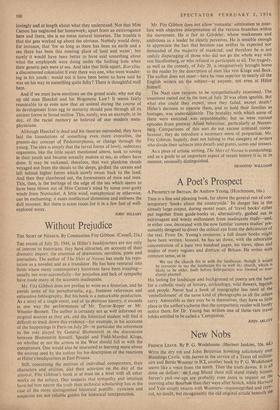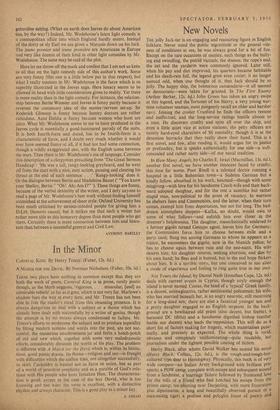New Nobs
FRENCH LEAVE. By P. G. Wodehouse. (Herbert Jenkins, 10s. 6d.) WITH the dry rot and John Betjeman hovering solicitously over Blandings Castle, with Jeeves in the service of a Texas oil million- aire and Bertle Wooster in ICI, another book by P. G. Wodehouse seems like a voice from the tomb. Then the truth dawns. It is all done on dollars : on Long Island there still stand stately homes, Jeeves's pick-me-ups are probably even more in request on the morning after Bourbon than they were after Scotch, while Harvard and Yale simply swarm with Woosters—transmogrified and crew- cut, no doubt, but recognisably the old original article beneath the
gaberdine suiting. (What on earth does Jeeves do about American ties, by the way?) Indeed, Mr. Wodehothse's latest light comedy is a cosmopolitan affair into which England hardly enters. Instead of the dotty or sly Earl we are given a Marquis down on his luck. The jeune premier and jeune premiere are Americans in Europe and very like dozens of their kind in other light comedies by Mr. Wodehouse. The same may be said of the plot.
Here let me throw off the mask and confesS that I am not so keen as all that on the light comedy side of this author's work. Some are very funny (this one is a little below par in that respect), but what I really treasure in Mr. Wodehouse is the farce which is so superbly illustrated in the Jeeves saga. Here lunacy seems to be allowed its head with little consideration given to reality. Yet there is more reality than in the light comedy. For instance, the relation- ship between Bertie Wooster and Jeeves is funny partly because it reverses the customary idea of• the master /servant set-up. Sir Roderick Glossop is funny because looney doctors are rather ridiculous. Aunt Dahlia is funny because women who hunt are ditto. What Mr. Wodehouse seems to me to have produced in the Jeeves cycle is essentially a good-humoured parody of the nobs. It is both fourth-form and dated, but to be fourth-form is a characteristic of farce, and I doubt very much whether it would ever have seemed funny at all, if it had not had some connection, though a wildly exaggerated one, with the English scene between the wars. Then there is Mr. Wodehouse's use of language. Consider this description of a clergyman preaching from 'The Great Sermon Handicap' : 'He was a tall, rangy-looking greybeard, and he went off from the start with a nice, easy action, pausing and clearing his throat at the end of each sentence . . ."Rangy-looking' does it. Or the dialogue between Bertie and Madeleine Basset (` "You know your Shelley, Bertie." "Oh! Ah; Am I?" '). These things are funny, because of the verbal dexterity of the writer, and I defy anyone to read a page of Mr. Wodehouse's best work without finding himself astonished at the achievement of sheer style. Oxford University has been much criticised by serious-minded people for giving him a D.Litt. (honoris causa), but it strikes me that such a writer has rather more title to this honorary degree than most people who get them. Certainly there is more connection between him and litera- ture than between a successful general and Civil Law.
ANTHONY HARTLEY



































 Previous page
Previous page